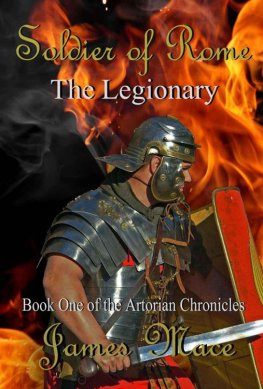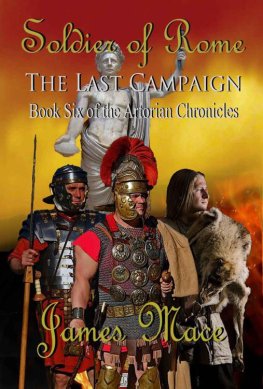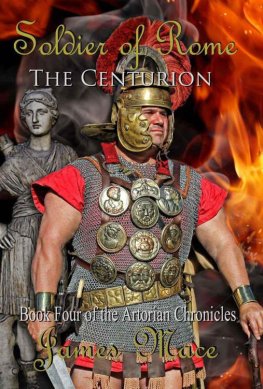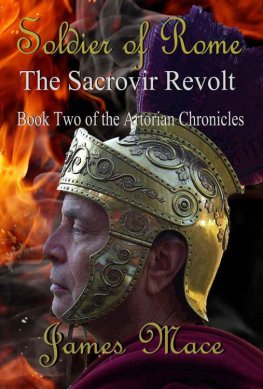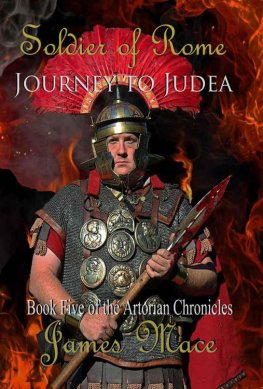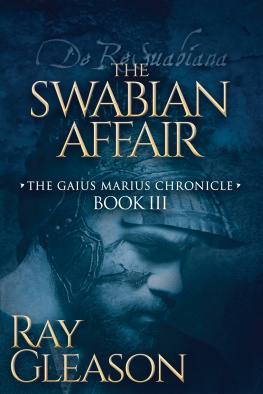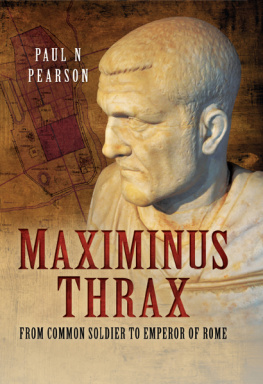James Mace - Soldier of Rome: Heir to Rebellion
Here you can read online James Mace - Soldier of Rome: Heir to Rebellion full text of the book (entire story) in english for free. Download pdf and epub, get meaning, cover and reviews about this ebook. genre: Adventure. Description of the work, (preface) as well as reviews are available. Best literature library LitArk.com created for fans of good reading and offers a wide selection of genres:
Romance novel
Science fiction
Adventure
Detective
Science
History
Home and family
Prose
Art
Politics
Computer
Non-fiction
Religion
Business
Children
Humor
Choose a favorite category and find really read worthwhile books. Enjoy immersion in the world of imagination, feel the emotions of the characters or learn something new for yourself, make an fascinating discovery.
- Book:Soldier of Rome: Heir to Rebellion
- Author:
- Genre:
- Rating:3 / 5
- Favourites:Add to favourites
- Your mark:
- 60
- 1
- 2
- 3
- 4
- 5
Soldier of Rome: Heir to Rebellion: summary, description and annotation
We offer to read an annotation, description, summary or preface (depends on what the author of the book "Soldier of Rome: Heir to Rebellion" wrote himself). If you haven't found the necessary information about the book — write in the comments, we will try to find it.
Soldier of Rome: Heir to Rebellion — read online for free the complete book (whole text) full work
Below is the text of the book, divided by pages. System saving the place of the last page read, allows you to conveniently read the book "Soldier of Rome: Heir to Rebellion" online for free, without having to search again every time where you left off. Put a bookmark, and you can go to the page where you finished reading at any time.
Font size:
Interval:
Bookmark:
James Mace
Soldier of Rome: Heir to Rebellion
Preface
Gaul, A.D. 21
A year has passed since the end of the Gallic rebellion of Sacrovir and Florus. Retribution has been exacted and the province is at peace once more. And yet there are some who escaped Romes justice. They are led by a man whose heart burns with hate; an heir to rebellion. Knowing that there can be no victory against the legions; his vengeance can only be wrought through terror and murder. The Gallic city of Lugdunum will be the first to taste his wrath.
The city of Lugdunum flourishes; the Twentieth Legions Third Cohort having been stationed within the city since the end of the Sacrovir Revolt. For Centurion Proculus and his legionaries their comfortable assignment will soon come unraveled as a series of grisly murders looks to upset the order of the city. Sergeant Artorius inadvertently finds himself at the center of the search to find these mysterious killers before they undermine the citys faith in the protection of the legions; a search that will lead him on a journey into the darkest corners of what lurks in a broken mans wicked soul.
Chapter I: Rebellions Heir
Massilia, Gaul
April, A.D. 21
It was a good sword; a bit gaudy for his taste perhaps, but a fine weapon nonetheless. Sacrovir had had an affinity for cavalry weapons, and this spatha had been specially made for him. Well balanced, it rested easily in his hands. Heracles turned it over while running an oiled cloth along the blade. The blade had been honed to a fine edge, working all the nicks and burrs from where the weapon had lain. It had been buried in Sacrovirs heart as his burning estate collapsed over his head. The Romans had made no effort to excavate the ruins, content as they were that the rebel leader was dead.
Romans, Heracles thought to himself as he let out a sigh. I hate Romans! Indeed he had plenty of reasons to hate Rome. He had been an impulsive gambler in his past life, much to his wifes chagrin. Things were taken too far when he tried to take on the provisional governor himself.
Heracles had always taken it as a personal umbrage that his native Sparta was little more than a sub province of the Roman Empire. He had sought to humiliate the governor at a gladiatorial spectacle, placing a massive wager that he knew he could not cover. Before the match Heracles was caught trying to bribe one of the combatants into losing. The governors bodyguards beat him and dragged before the man, in full view of his fellow Spartans. The governor became enraged at how the Greek had tried to humiliate him he declared that if Heracles was determined to fix gladiatorial fights, he could do so from within the arena. His wife and children were seized and taken away, their property confiscated in retribution to what the governor called a blasphemous insult against your betters.
Betters, Heracles growled inside. No Roman is my better!
Memories enveloped him as he remembered all too well; his wife and children were sold into slavery, while he was beaten once more and left in the hands of the local gladiatorial school where his hatred consumed him. He spent several years in the arena, being cavorted all around the Empire, gradually making his way west. It was not too far from where he was now that he fought his final battle in the arena. His hands trembled at the memory, almost cutting him on the swords razor sharp blade.
It was during the autumn festival, and the magistrate wanted to celebrate with games and gladiatorial matches. Heracles was amongst the prime attractions. Heracles was not his real name; but rather one given to him for his terrifying feats in the arena. Though only a small percentage of matches ended in death, his high rate of killing made him feared amongst the other gladiators, and loved by the spectators. This time would be no different; he would not be deferring to the crowd as to whether his foe lived or died. Indeed the young whelp that faced him in the sand proved little match for him. He had seen the young man fight before, always with a masked helmet on, and often being overwhelmed by the more experienced fighters. On at least two occasions the crowd signaled that they wanted him slain by his conqueror, only to have the magistrate overturn the crowd and allow the man to live. It baffled Heracles, because the magistrate had had no issue with allowing other gladiators to be executed, even some who had fought far better than this pathetic excuse of a fighter.
He took it as an insult when on the last day of the festival Heracles was slated to fight this man. So tired was he of watching this pathetic gladiator be allowed to live that he stabbed him through the heart with sheer malice as soon as he tripped him to the ground. Then tragedy struck. He roughly ripped the masked helm and gazed on the face of his own son. The lad reached for him piteously as blood streamed out of both corners of his mouth. Heracles strength left him as he fell to his knees. In an instant he realized the sick and twisted mind of his captors; to have had his own son so close for so long, and yet completely out of reach. Only now did they place father and son in the arena together, knowing that unwittingly Heracles would destroy his own flesh and blood. He sobbed that only a short moment ago he wanted, and looked forward to, killing the young man.
Heracles set down the sword and closed his eyes. He had tried to plunge his blade into his own heart, but was forcibly restrained by guards. He refused to fight thereafter and was cruelly punished by scourging. When the slave master realized there was no fight left in him, he sold Heracles to a noble family. They soon learned that he could read and write and he started his life anew. The family told him news of his wife. She had been sold to a brothel and hanged herself. He would never learn the fate of his daughter.
His new owners treated him kindly enough, but they were still Romans and therefore his enemies. Heracles bore the indignity of teaching their children Greek letters well enough, but he refused to allow any compassion to enter his heart. It was when the father was away that he took the first steps of his revenge on the Roman people. Pity and any sense of remorse had died with his family, making it all too easy to slash the throats of the Roman babes while they slept. The wife took much more doing, for he first had to be rid of her troublesome maidservant. He was pleasantly surprised to learn that if honed sharp enough, a butchers cleaver could sever a human head from its shoulders. He had at first thought to rape the domina of the house, but so hot was his hatred that his manhood failed him. She had mocked his lack of masculinity as she struggled in his grasp. He then settled for disemboweling her, spilling her entrails with repeated blows of the cleaver. He left her convulsing in agony as death took its time coming for her. With as much coin as he could carry and one of the childrens horses he fled. Racing through the night he felt a morbid sense of satisfaction. There was no room in his now blackened heart for anything else. If happiness was gone forever from his life and such feelings were the best he could hope for, then so be it.
It was in the north, outside of Augustodunum, that he met Sacrovir and Florus. The two men were Gallic nobles who sought to plant the seeds of rebellion. Heracles cared little for Gauls, viewing them as unkempt barbarians even after more than seventy years of Roman rule and influence. However, he saw an opportunity to further unleash his revenge. Unfortunately, Sacrovir and Florus were not military men. Florus was the typical pompous noble who only sought rebellion as a means of freeing himself from his debts. Sacrovir, while eager and cunning had made the most of his fortune financing gladiatorial games. He had lost a substantial portion of this when one of his best was killed by a common Roman soldier. Heracles found it ironic that his own gambling lust had long since perished.
Font size:
Interval:
Bookmark:
Similar books «Soldier of Rome: Heir to Rebellion»
Look at similar books to Soldier of Rome: Heir to Rebellion. We have selected literature similar in name and meaning in the hope of providing readers with more options to find new, interesting, not yet read works.
Discussion, reviews of the book Soldier of Rome: Heir to Rebellion and just readers' own opinions. Leave your comments, write what you think about the work, its meaning or the main characters. Specify what exactly you liked and what you didn't like, and why you think so.


